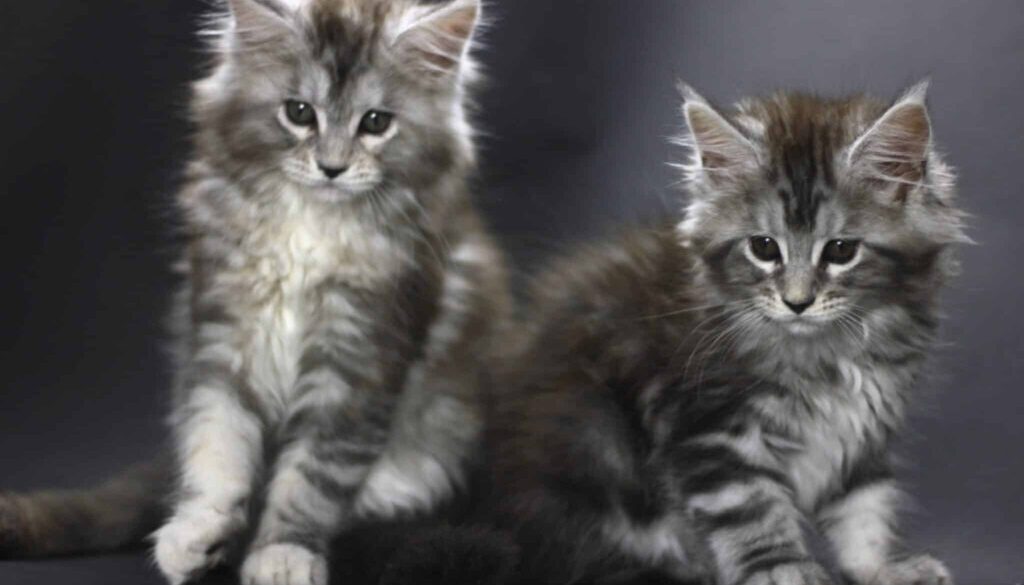Maine Coon Kitten Care Guide: Tips for Bringing Home Your New Companion
Are you considering bringing home a Maine Coon kitten? Congratulations on your decision! Maine Coons are known for their loving and gentle nature, making them wonderful companions for individuals and families alike. In this comprehensive guide, we will provide you with all the information you need to ensure that your new feline friend has a happy and healthy start in their new home.
When looking for a Maine Coon kitten, it’s essential to do your research and find a reputable breeder. Make sure to visit the breeder’s facilities to see how the kittens are raised and socialized. Look for a kitten that is active, curious, and friendly towards humans.
Choosing the Right Maine Coon Kitten
When it comes to choosing the right Maine Coon kitten, there are a few important factors to consider. Maine Coons are known for their friendly and sociable nature, making them great companions for individuals and families alike. Here are some tips to help you select the perfect kitten for your home:
- Research reputable breeders: Look for breeders who have a good reputation and prioritize the health and well-being of their cats. Visit the breeder’s facilities if possible to see how the kittens are raised and interact with their environment.
- Meet the kittens in person: Spend time interacting with the kittens to get a sense of their personality and temperament. Look for kittens that are curious, playful, and friendly towards humans. Avoid kittens that seem skittish or overly aggressive.
- Observe the kitten’s health: Check for any signs of poor health, such as runny eyes or nose, lethargy, or unkempt fur. A healthy Maine Coon kitten should have bright eyes, a shiny coat, and be alert and active.
- Ask about the kitten’s background: Inquire about the kitten’s pedigree, lineage, and any health screenings or vaccinations they have received. A reputable breeder will be transparent about the kitten’s history and provide you with any relevant information.
- Consider your lifestyle: Think about your living situation, schedule, and level of activity when choosing a Maine Coon kitten. Some kittens may be more high-energy and require more playtime and stimulation, while others may be more laid-back and independent.
By taking the time to research and choose the right Maine Coon kitten for your home, you can ensure that you and your new feline friend have a strong and lasting bond that brings joy and companionship for years to come.
Preparing for Your Kitten’s Arrival
Before bringing your Maine Coon kitten home, it’s essential to prepare for their arrival to ensure a smooth transition. Here are some tips to help you get ready:
- Gather necessary supplies: Make a list of essential items such as a litter box, food and water dishes, high-quality kitten food, a cozy bed, toys, scratching posts, and grooming tools. Purchase these supplies in advance so that your kitten has everything they need upon arrival.
- Create a safe and welcoming environment: Designate a quiet and secure space in your home where your kitten can adjust to their new surroundings. Set up their litter box, food and water dishes, and a comfortable bed in this area. Make sure to remove any potential hazards or toxic plants from the space.
- Introduce other pets gradually: If you have other pets at home, introduce them to your new kitten slowly and under supervision. Allow them to sniff each other and get used to each other’s scent before allowing direct interactions. Provide separate eating and sleeping areas for each pet to prevent territorial disputes.
- Schedule a vet appointment: Arrange a visit to the veterinarian for your kitten shortly after bringing them home. Your vet can conduct a health check, administer vaccinations, deworm the kitten, and provide advice on proper care and nutrition.
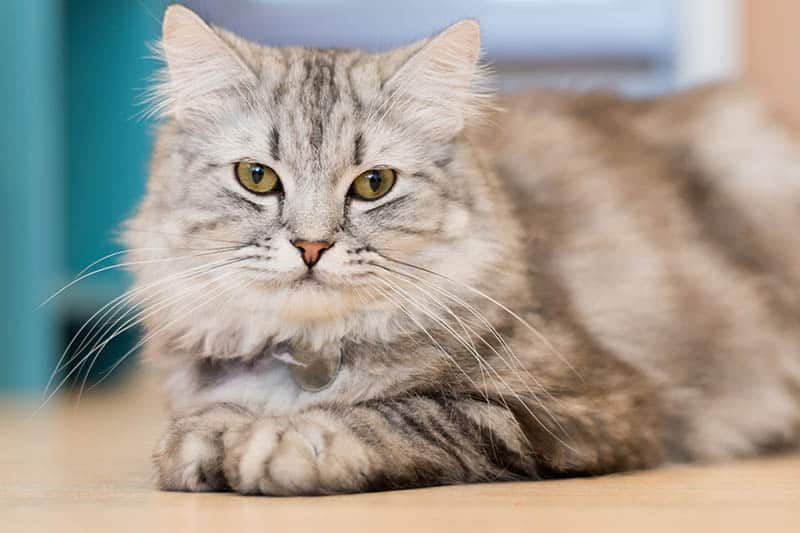
Setting Up a Safe Space for Your Kitten
Creating a safe and comfortable space for your Maine Coon kitten is crucial for their well-being and adjustment to their new home. Here are some steps to ensure their space is secure:
- Choose a quiet location: Select a peaceful location in your home for your kitten’s safe space. Avoid areas with high foot traffic, loud noises, or potential dangers like electrical cords or toxic plants.
- Provide essential amenities: Set up a litter box in a quiet corner away from their food and water dishes. Ensure the litter box is easily accessible and cleaned regularly. Place a cozy bed or blanket in the space for your kitten to rest and feel secure.
- Include enrichment items: Offer toys, scratching posts, and climbing structures to keep your kitten mentally stimulated and physically active. Rotate toys regularly to prevent boredom and encourage playtime.
- Monitor temperature and humidity: Ensure the temperature in your kitten’s space is comfortable and consistent. Provide a warm and draft-free environment, especially for young kittens who may be more sensitive to changes in temperature.
By preparing for your Maine Coon kitten’s arrival and setting up a safe space customized to their needs, you can create a welcoming and secure environment that helps them feel at ease and thrive in their new home.
Feeding Your Maine Coon Kitten
Proper nutrition is essential for the growth and development of your Maine Coon kitten. Here are some guidelines for feeding your new feline companion:
- Choose a high-quality kitten food: Look for a balanced diet specifically formulated for kittens to support their nutritional needs. Opt for food that is rich in protein and essential nutrients to promote healthy growth and muscle development.
- Follow feeding instructions: Read the guidelines provided on the kitten food packaging to determine the appropriate serving size for your kitten based on their age, weight, and activity level. Feed your kitten at regular intervals throughout the day to maintain a consistent feeding schedule.
- Provide fresh water: Make sure to keep a bowl of clean, fresh water available for your kitten at all times. Hydration is essential for their overall health and well-being, especially during their growth stages.
- Monitor your kitten’s weight: Keep an eye on your kitten’s weight and body condition to ensure they are growing at a healthy rate. Consult your veterinarian if you notice any significant changes in their appetite, weight, or eating habits.
By following these tips for preparing for your Maine Coon kitten’s arrival, setting up a safe space, and providing proper nutrition, you can ensure that your new feline companion has a smooth transition and a healthy start in their new home.
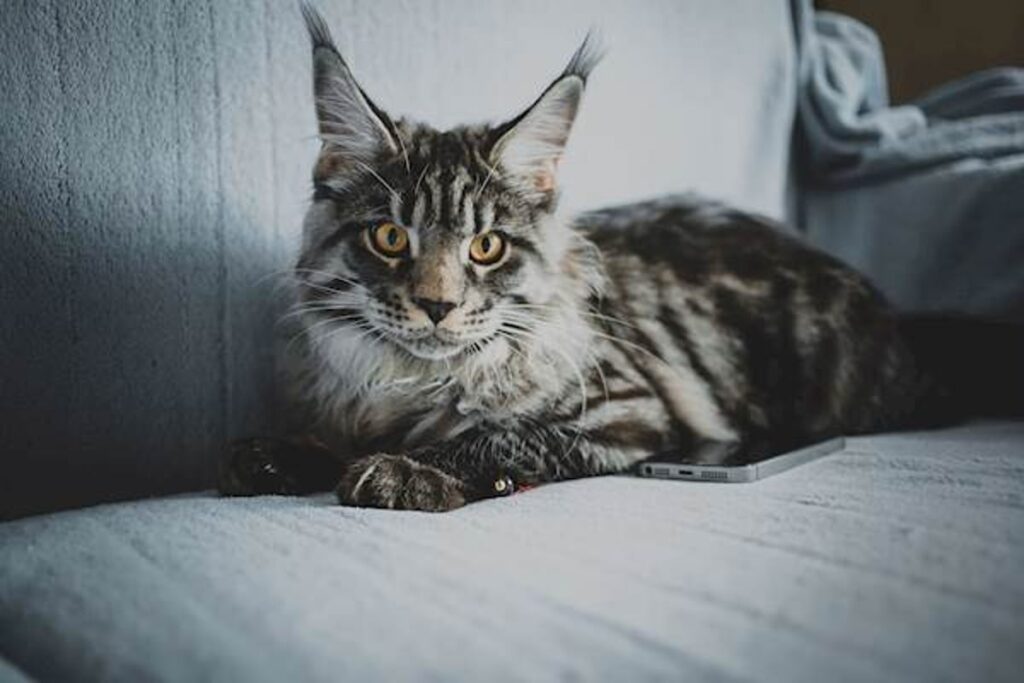
Grooming and Hygiene Tips
Maintaining proper grooming and hygiene practices is essential for keeping your Maine Coon kitten healthy and comfortable. Here are some tips to help you care for your kitten’s coat and overall cleanliness:
- Regular brushing: Maine Coon kittens have semi-long fur that can become tangled and matted if not groomed regularly. Brush your kitten’s coat several times a week using a soft-bristle brush or comb to remove loose fur and prevent matting.
- Bathing when necessary: While Maine Coon kittens are generally good at grooming themselves, you may need to give them an occasional bath to keep their coat clean and free of dirt and debris. Use a mild kitten shampoo and lukewarm water, and be gentle during the bathing process.
- Trimming nails: Keep your kitten’s nails trimmed to prevent them from getting too long and causing discomfort or injury. Use a pair of pet nail clippers to trim the tips of their nails, being careful not to cut into the quick (the pink part of the nail that contains nerves and blood vessels).
- Cleaning ears and teeth: Check your kitten’s ears regularly for signs of dirt, wax buildup, or infection. Use a damp cotton ball to gently clean the outer ear area, avoiding inserting anything into the ear canal. Brush your kitten’s teeth regularly with a soft toothbrush and pet-friendly toothpaste to maintain their dental health.
Playing and Exercising with Your Kitten
Maine Coon kittens are playful and active, so it’s important to provide them with plenty of opportunities for play and exercise to keep them healthy and stimulated. Here are some ideas for engaging with your kitten through play:
- Interactive toys: Provide your kitten with a variety of interactive toys such as feather wands, laser pointers, and puzzle feeders to keep them entertained and engaged. Rotate the toys regularly to prevent boredom and encourage mental stimulation.
- Scratching posts: Maine Coon kittens have a natural instinct to scratch, so offer them scratching posts or pads to help satisfy this behavior. Place the scratching posts in various locations around your home to give your kitten options for scratching.
- Playtime together: Dedicate time each day to play with your kitten and engage in interactive games like chase, hide-and-seek, or feather toy play. Bonding through play helps strengthen your relationship with your kitten and provides them with valuable physical and mental exercise.
- Outdoor exploration: If safe and supervised, allow your kitten to explore outdoor spaces such as a secure backyard or enclosed patio. Outdoor exploration can provide enrichment and sensory stimulation for your kitten while allowing them to experience the sights and sounds of the natural world.
Training and Socializing Your Kitten
Early training and socialization are crucial for helping your Maine Coon kitten develop into a well-behaved and well-adjusted adult cat. Here are some tips for training and socializing your kitten effectively:
- Positive reinforcement: Use positive reinforcement techniques such as treats, praise, and toys to reward your kitten for good behavior and encourage them to repeat desirable actions. Avoid punishment-based training methods that can instill fear or anxiety in your kitten.
- Basic commands: Teach your kitten basic commands such as “sit,” “stay,” and “come” through consistent and patient training sessions. Use small, tasty treats as rewards and practice the commands in different environments to reinforce learning.
- Exposure to new experiences: Introduce your kitten to a variety of people, animals, sounds, and environments to help them become well-socialized and confident. Gradually expose them to new stimuli and experiences, offering plenty of positive reinforcement and reassurance.
- Litter box training: Encourage proper litter box habits by providing a clean and accessible litter box, using the same type of litter consistently, and rewarding your kitten for using the box appropriately. Be patient and consistent in your training efforts to help your kitten develop good bathroom habits.
By incorporating grooming and hygiene practices, playing and exercising with your kitten, and focusing on training and socialization, you can provide your Maine Coon kitten with a well-rounded and enriching upbringing that sets the foundation for a happy and healthy life as a cherished companion.
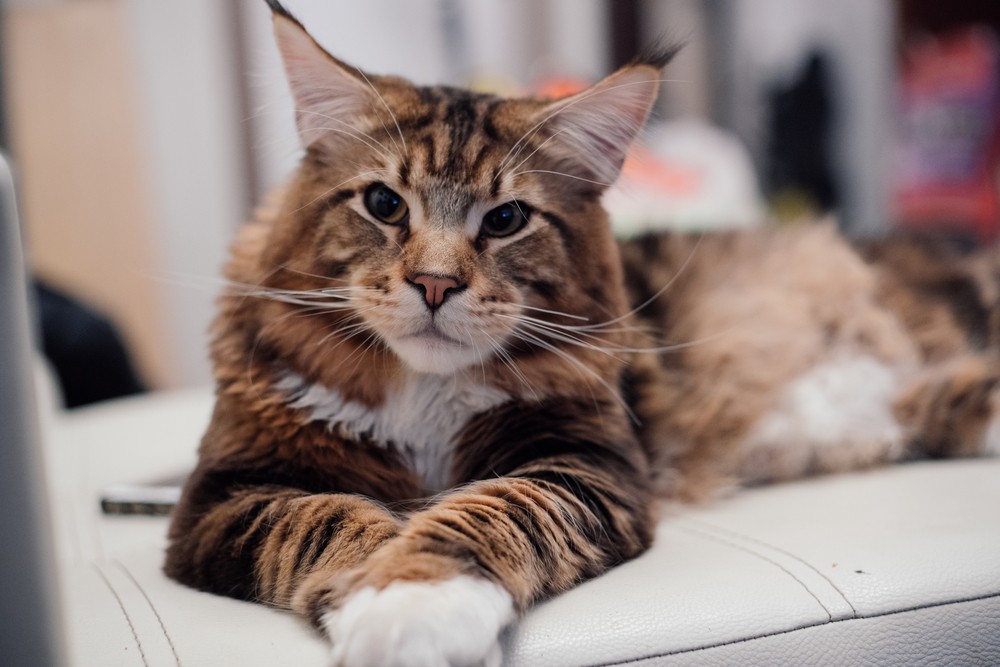
Health Care and Vet Visits
Regular veterinary care is crucial for maintaining the health and well-being of your Maine Coon kitten. Here are some essential healthcare tips and guidelines to ensure your kitten receives proper medical attention:
- Vaccinations: Maine Coon kittens require a series of core vaccinations to protect them against common diseases such as feline viral rhinotracheitis, calicivirus, panleukopenia, and rabies. Follow your veterinarian’s recommended vaccination schedule to ensure your kitten is fully protected.
- Parasite prevention: Protect your kitten from internal and external parasites such as fleas, ticks, worms, and ear mites by following a regular parasite prevention program recommended by your veterinarian. Administering flea and tick preventatives, deworming medications, and ear mite treatments as directed can help keep your kitten healthy and parasite-free.
- Spay/neuter surgery: Discuss the appropriate time for spaying or neutering your Maine Coon kitten with your veterinarian. Spaying and neutering not only prevent unwanted litters but also offer health benefits and help reduce the risk of certain reproductive-related health issues.
- Dental care: Maintain good dental hygiene for your kitten by brushing their teeth regularly with a pet-safe toothbrush and toothpaste. Schedule annual dental check-ups with your veterinarian to monitor your kitten’s oral health and address any dental issues promptly.
- Regular check-ups: Schedule regular wellness exams with your veterinarian to monitor your Maine Coon kitten’s overall health, growth, and development. Your vet can perform routine screenings, address any health concerns, and provide personalized care recommendations based on your kitten’s individual needs.
Common Health Issues in Maine Coon Kittens
Maine Coon kittens are generally healthy and robust cats, but like all breeds, they can be prone to certain health issues. Here are some common health concerns that Maine Coon kittens may experience:
- Hip dysplasia: Maine Coons are one of the breeds predisposed to hip dysplasia, a developmental orthopedic condition that affects the hip joints. Watch for signs of lameness, difficulty standing or walking, and reduced activity levels in your kitten.
- Hypertrophic cardiomyopathy (HCM): HCM is a heart disease commonly seen in Maine Coon cats. Regular cardiac screenings and monitoring by a veterinarian can help detect and manage this condition early.
- Polycystic kidney disease (PKD): PKD is an inherited condition that causes the formation of cysts in the kidneys. Genetic testing and regular kidney screenings can help identify and manage this condition in Maine Coon kittens.
- Obesity: Maine Coon cats have a tendency to gain excess weight if not fed a balanced diet and provided with regular exercise. Monitor your kitten’s weight and body condition to prevent obesity-related health issues.
- Gastrointestinal issues: Maine Coon kittens may be prone to digestive issues such as sensitive stomachs, food intolerances, or inflammatory bowel disease. Consult your veterinarian if your kitten experiences chronic gastrointestinal symptoms such as vomiting, diarrhea, or appetite changes.
By staying proactive with your Maine Coon kitten’s health care, attending regular vet visits, and staying informed about common health issues in the breed, you can help ensure your furry companion leads a happy, healthy, and fulfilling life by your side.
Dealing with Behavioral Problems
Maine Coon kittens, like any other breed, may exhibit various behavioral issues as they adjust to their new home and surroundings. Here are some tips for dealing with common behavioral problems in Maine Coon kittens:
- Litter box issues: If your kitten is having accidents outside the litter box, check for cleanliness, accessibility, and any potential stressors in their environment. Ensure the litter box is kept clean, in a quiet location, and easily accessible for your kitten.
- Scratching furniture: Provide your kitten with appropriate scratching posts or pads and redirect their scratching behavior towards these designated areas. Use deterrents like double-sided tape or citrus sprays on furniture to discourage scratching.
- Aggression: If your kitten displays aggressive behaviors such as biting or scratching, intervene calmly by redirecting their behavior and providing alternatives for play and stimulation. Avoid punishing your kitten and focus on positive reinforcement for desired behaviors.
- Excessive meowing: Some Maine Coon kittens may be vocal and expressive through meowing. Address excessive meowing by ensuring all their needs are met, including food, water, litter box access, and attention. Engage in interactive play and bonding activities to help reduce excessive vocalization.
- Anxiety or stress: Maine Coon kittens can experience anxiety or stress in new environments or due to changes in routine. Provide a secure and comforting space for your kitten, offer plenty of enrichment and mental stimulation, and consider pheromone products or calming supplements to help ease their anxiety.
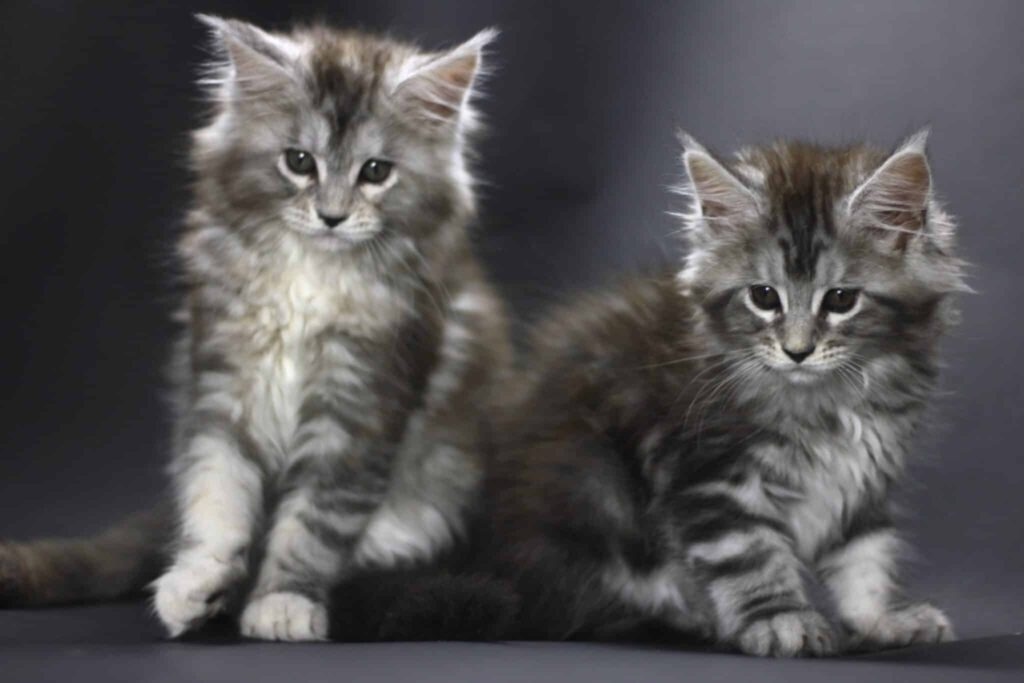
Making Your Maine Coon Kitten Feel at Home
Creating a welcoming and comfortable environment is key to helping your Maine Coon kitten feel at home and settle into their new surroundings. Here are some tips for making your kitten feel safe and secure:
- Establish a routine: Maintain a consistent daily routine for feeding, playtime, grooming, and sleep to provide structure and stability for your kitten. Predictability can help reduce stress and anxiety in your kitten.
- Provide comfort and security: Offer your kitten a cozy bed, blankets, and a warm sleeping area to help them feel safe and secure. Allow your kitten to retreat to their designated space when they need privacy or relaxation.
- Encourage exploration: Allow your kitten to explore their new home gradually and under supervision to become familiar with their surroundings. Create safe spaces for climbing, hiding, and exploring to satisfy their natural curiosity.
- Bond through interaction: Spend quality time bonding with your Maine Coon kitten through play, grooming, and cuddling. Building a strong bond early on can help strengthen your relationship and create a sense of trust and companionship.
Conclusion
Welcoming a Maine Coon kitten into your home is an exciting and rewarding experience that comes with its own set of challenges and joys. By preparing for their arrival, setting up a safe and nurturing environment, addressing health care needs, and understanding their behaviors, you can ensure your kitten’s smooth transition and overall well-being.
Remember to prioritize their physical and emotional health through regular vet visits, proper nutrition, grooming, and socialization. Stay patient, attentive, and proactive in addressing any behavioral issues or health concerns that may arise, and seek guidance from your veterinarian or a reputable behaviorist if needed.
With love, patience, and proper care, your Maine Coon kitten can thrive and grow into a happy, healthy, and well-adjusted companion who brings joy and companionship to your life for years to come. Enjoy the journey of welcoming your new furry family member into your home and creating lasting memories together.
Also, Read:
